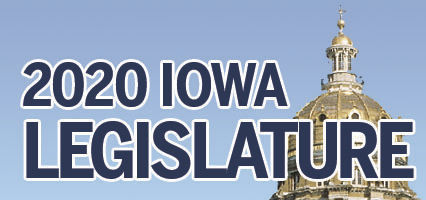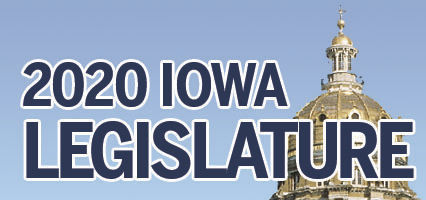House approves changes to limit secretary of state emergency powers

DES MOINES — The Iowa House approved changes to a Senate bill Thursday to allow the secretary of state to mail absentee ballot requests to all registered voters during an emergency if a legislative panel gives its consent.
After Gov. Kim Reynolds declared a public emergency because of the coronavirus pandemic, Secretary of State Paul Pate mailed absentee ballot request forms to registered voters ahead of the state’s June 2 primary election, which broke turnout records.
While that was popular with many Iowans, Republican legislative leaders in the Senate pushed a bill that would ban the secretary of state’s ability to do so again.
House Republicans worked with Democrats to amend the bill, saying the Legislature should have the final say on how elections are conducted. Those changes were approved 95-2 in the House on Thursday night.
“There’s a dire need to put common sense constraints on the secretary of state because they’re sorely needed,” the amendment’s sponsor, Republican Rep. Bobby Kaufmann, said.
The governor’s emergency powers “are expressly permitted, have a time limit and a legislative override,” he said, but the secretary of state’s “are too vague to even be anything resembling predictable.”
The amendment he offered with Rep. Bruce Hunter, D-Des Moines, was a compromise between current law and the Senate-passed ban.
Although Pate’s actions were praised by both political parties — Pate is a Republican — Kaufmann said requiring approval by the Legislative Council before mailing ballot requests would prevent “one individual from having unchecked power to change election law.”
The Senate version of the bill allows county election officials, campaigns and political parties to mail absentee ballot requests with the approval of their county supervisors, but prohibited the secretary of state from doing the same.
“What he did was legal,” Kaufmann said about Pate’s decision to mail the requests and to extend the absentee voting period beyond the 29 days in current law. But it was not responsible because of the precedent it set.”
Left unchecked, the secretary could just as easily reduce absentee voting from 29 to five days, Kaufmann said.
“We think that’s important no matter who’s secretary of state, that one person shouldn’t have the authority to make such significant elections changes without the Legislature’s involvement,” Kaufmann said.
The amendment would require that secretary of state, when making changes under emergency powers, to go before the Legislative Council. The council could approve or reject the plan or come up with its own plan.
The Legislative Council is a 20-member “steering committee” of legislators that acts when the full Legislature is not in session. It includes leaders, senior members and chairmen and ranking minority party members of various committees.
In the Senate, HF 2486 passed 30-19 with only Republican votes. Two Republicans voted against it.
House Republicans made it “loud and clear” they didn’t agree with the Senate version and wanted “a bipartisan effort … to show the people that we can come together and have a bipartisan legislation that expands voting rights,” Kaufmann said.
If the Senate concurs, the bill also includes numerous other elections changes, including a limit on the extent to which local elections officials can reduce the number of polling locations during an emergency and a requirement that voters complete verification information on absentee ballot request forms.
It also addresses the election of Democratic and Republican presidential electors — the people who cast Iowa’s Electoral College cotes — to require them to pledge to mark their ballots for the party that nominated them.
Smoking age 21
Also Thursday, the House approved a bill that would conform Iowa code to a new federal law by raising the legal smoking age to 21.
In January, the federal government made it illegal to sell tobacco products to anyone under the age of 21. The previous limit was 18. The change previously was approved by the Senate, 43-6.













